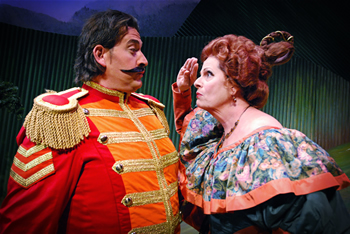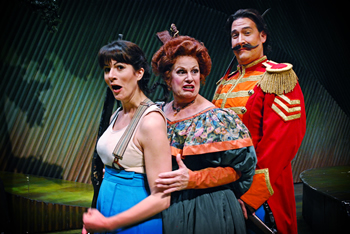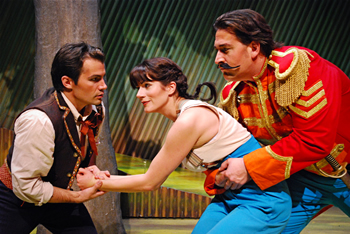Virginia Opera:
Donizetti’s The Daughter of the Regiment
By Gabriela Ramírez-Carr
December 2009
The Daughter of the Regiment (La fille du regiment)
By Gaetano Donizetti (1797-1848)
Libretto by Jean-Francois-Alfred-Bayard and Jules-Henri Vernoy de Saint-Georges
The Virginia Opera at George Mason University
Conductor: Joseph Walsh
The bel canto composer, Gaetano Donizetti (1797-1848), is usually reported to be “non political,” but in fact, he waged open political warfare with Italy ’s aristocracy and their censors, because they wanted the national institution of opera to be simple “entertainment for the masses,” rather than a cultural event that would provoke thinking and inspiration for a politicized but oppressed population. His 1839 comic opera, “La fille du regiment,” goes a long way in promoting his resistance to this reactionary control.
Donizetti turns a simple love story into a patriotic, biting social commentary on Europe ’s aristocracy, and its control over even the smallest details of everyday life. An orphaned baby girl is adopted by a French army regiment, and she later falls in love with a local peasant. Just as the two commit themselves to each other, the pretentious, aristocratic, Marquise de Berkenfeld announces that the orphan, Marie, is really her “niece,” and must immediately abandon her romance, move to the family chateau, and instead, have an arranged marriage to a Duke from the Krakenthorp family.
 Todd Robinson as Sergeant Sulpice and mezzo-soprano Josepha Gayer as Marquise de Berkenfeld. Photo: Anne M Peterson |
In the process, Donizetti pulls back the curtain of this horror show of the “life of the rich and famous.” Despite their privileged lives, these families are completely dysfunctional, have a high rate of mental problems, and have as a sole mission, to perpetuate their degenerate family lineage (even though this is sometimes a physical impossibility and they must rely on “outside” help). By the end of the first act, Donizetti sends the humiliated Marquise off stage by a raucous, jeering crowd (perhaps similar to the recent reception of many US Congressmen at their August town hall meetings).
Through Donizetti’s music, this message can be brought to life on the opera stage, and much of this theme came through in the Virginia Opera’s December, 2009 production at George Mason University in Northern Virginia . It was clear to the audience, as the stuffy aristocrats were juxtaposed to the young, lively, and free, Marie. However, changes to the staging, the dialogue, and even the story line, unfortunately reduced the intensity that Donizetti had created.
Staging Changes Blunt the Point
The first important difference appeared at the opening of Act II, in the music lesson in the palatial chateau, where Marie completely rejected the meaningless existence of high society, and instead, walked to the other side of the room to join her sergeant to sing the song of her regiment, rather than continuing with tedious voice rehearsals with the Marquise, who was not interested in developing a beautiful voice, but was rather only using the lesson to teach Marie what is expected of a “proper lady.” In the staging of this scene in the Virginia Opera, Marie, the tomboy, seemed too enamored with her fancy new shoes and pretty white dress, and it was the sergeant who had to come over to her side of the room to try to convince Marie that this was not the life for her.
 Soprano Manon Strauss Evrard as Marie, mezzo-soprano Josepha Gayer as Marquise de Berkenfeld and Todd Robinson as Sergeant Sulpice. Photo: Anne M Peterson |
A bigger problem was the altered ending that not even Donizetti would recognize. Instead of Marie changing the Marquise and eventually organizing the Marquise to support her marriage to her true love, Tonio, and living her life serving her country; in the altered ending the arranged marriage is called off only because the would-be bride and groom have the same father. Instead of a lesson on “Life, liberty, and the pursuit of happiness,” the aristocrats are defeated, but only by a technical oversight, and the entire plot is reduced to a personal relationship that could almost work as well in a TV soap opera. In a time of crisis, society needs great beauty and also heavy ideas, and the role of any classical art is to challenge an audience to look beyond the superficial, and into the deeper roots of problems—usually imbedded in the culture of a society. Here great pains are taken to describe the problem of a society based on an aristocratic human pecking order, yet in the end, this is not truly resolved, since at the critical “punctum saliens” point, the focus is clouded by this fairy tale ending.
Excellent Bel Canto Singing
 Tenor Gennard Lombardozzi as Tonio, soprano Manon Strauss Evrard as Marie and bass Todd Robinson as Sargent Sulpice. Photo: Anne M Peterson |
Despite these dramatic shortcomings, the singing in this production makes it worthwhile. The spectacular soprano voice of Manon Strauss Evrard, and her portrayal of Marie was excellent, even an improvement over her last season’s wonderful Rosina in Rossini’s Barber of Seville. She was excellent then, and will likely fare well in her New York Met debut next year. Her farewell aria near the end of Act I, “Il faut partir,” was beautiful and very moving. Tonio, was played by Gennard Lombardozzi in his Virginia Opera debut. This is one of the most challenging tenor roles in all opera with the famous aria “Ah mes amis,” with the eight, rapid fire, high Cs near the beginning of Act I, where the tenor has little time to even warm up. On this night our tenor needed a little more work on technique and consistency but I hope to see him again in the near future. Also very impressive was Todd Robinson as Sergeant Sulpice who easily filled the auditorium with his bass voice, and the stage with his confidence and a bit of swagger. Mezzo-soprano Josepha Gayer, played the Marquise de Berkenfeld with great voice and enthusiasm for her role. David Barron did an excellent job as the baritone, Hortensius, the servant to the Marquise. When properly done, all of the other aristocrats fear the intimidating Duchess of Krakenthorp and mezzo-soprano, Jenni Harrison, had the stage presence to pull this off very convincingly. Keeping everything flowing in unison was conductor (and Associate Artistic Director) Joseph Walsh who kept great balance between the pit and stage. As with any Donizetti opera, the chorus has an important role to play and this chorus for the Virginia Opera did especially well. The opera ends with the full chorus, led by Marie, singing “Salut a la France ” which has become one of the great patriotic songs of France.
The Composer
Donizetti came from a poor family but since he showed such promising talent as a youth, he was given 10 years of musical tutoring by Simon Mayr (who never accepted a single payment) and Padre Mattei (who also taught Rossini). Donizetti would become an expert on the human voice and composed bel canto music in order to bring out the best in every type and range of voice. Donizetti would be a follower of the tradition of Mozart and Haydn and paved the way for Verdi, having composed over 65 operas. Although some of the libretti may have been a bit predictable, he also worked with Romani and others to create serious dramatic operas with more gravitas, including Anna Bolena, and also Maria Stuarda, which are based on Schiller’s work. He did several historical operas based on Tudor England, and since the subjects were Protestant and not Catholic, they were less closely scrutinized by the censors.
By the time of his death Donizetti dominated the opera world where a quarter of all operas being produced were his works. However, as his health was failing he was very happy to see Verdi rising to take his place. The poet, Heinrich Heine, would come to visit him and try to ease his suffering. And Felix Mendelssohn’s only regret was that he wished that he were the one who composed “La fille du regiment.”
Related pages:
Concerts at the Verdi Tuning- C=256HZ, A=432 Hz
